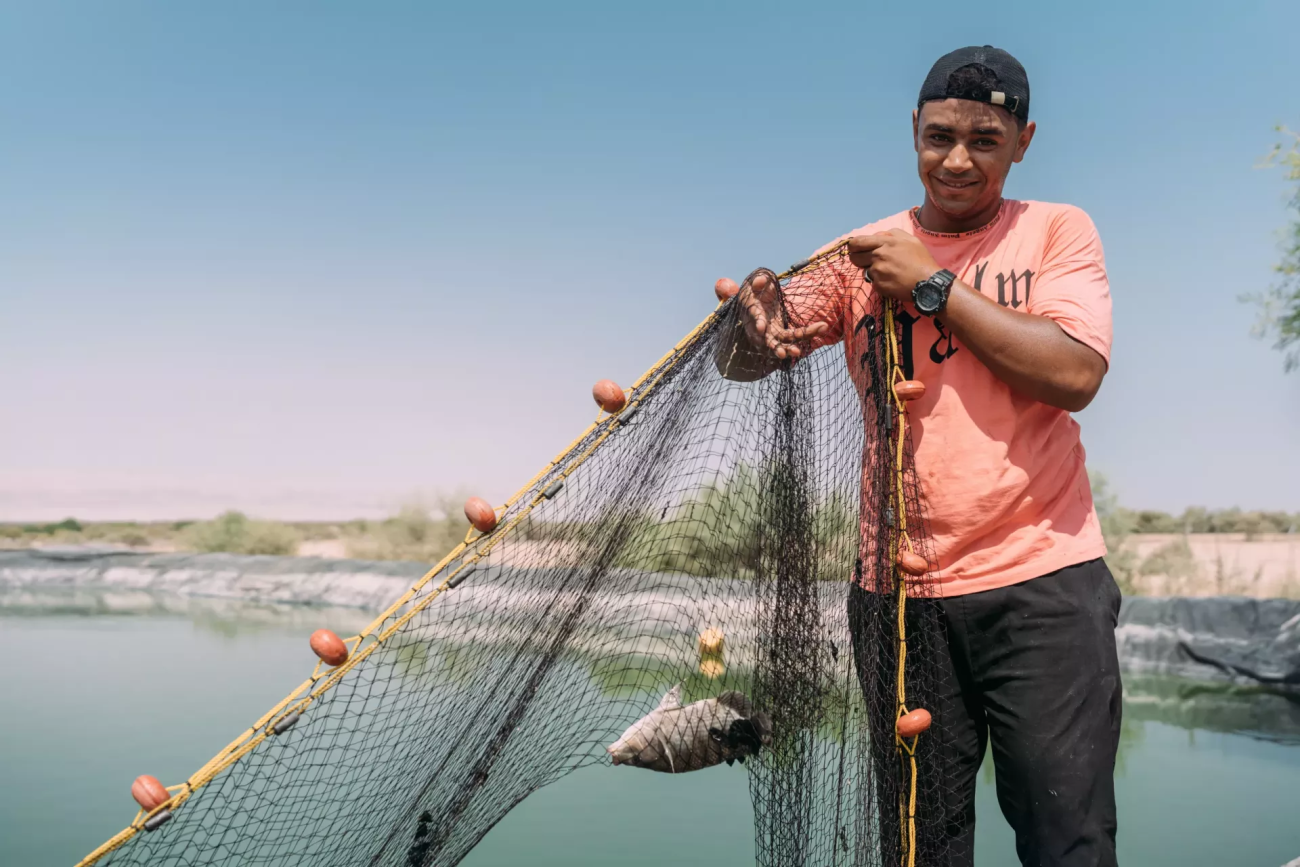Fish farming in the south of Jordan to harvest positive change for youth

The UNICEF-supported Azem programme provides opportunities where there aren’t many.
Daoud, 21, walks around to the opposite side of the pond, pulls one end of the seine net and starts walking back, harvesting fish as he goes.
The little town of Ghour Al Safi, some 150 kilometers south of Amman, is not known for its seafood cuisine. Yet with support from the UNICEF-supported Azem programme, four young people in the area are generating an income while introducing a new product into the local market through fish farming. The project is implemented in partnership with the Business Development Centre and a local women’s association.

In Jordan, unemployment remains one of the biggest challenges facing young people. The Azem programme aims to empower the most vulnerable youth to establish and sustain feasible micro businesses, with a focus on young women, community-based organizations, and the south of Jordan.
The young participants' journey with Azem started with entrepreneurship training, which covers topics like financial management and marketing. This is followed by a local market assessment and seed funding for the business.
“We were then taught the basics of how and when to feed the fish, when to harvest it and the entire process, at the women’s association. And now I come here every couple of days to feed the fish and harvest the requested amount. We’re currently taking care of some 16,000 fish.”
The opportunity has enabled Daoud to cover his living expenses. “There is a lack of job opportunities in the area,” he says. “Even if you have, let’s say, a master's degree, it’s still not easy to find a job.”
Daoud then reflects on why he sees the project as a success. “Small, new businesses like this one help address the unemployment problem in the area, but much more needs to be done.”

Salma, 21, is a mother of two. Even though she did not complete her education, she was still keen on seizing new opportunities to learn, grow and support herself and her family. “I’m so glad I didn’t miss out on this opportunity. Even though it was a new concept, I told myself I’ll come and try. It has been fascinating work, and it was my first time ever earning money.”
Salma’s role is in marketing and sales. “We utilize the women’s association's social media presence, and we also do in-person marketing, going from supermarket to another, explaining the product and its health benefits and nutritional value - and of course the great taste!”
The feedback has always been good, says Salma, and the demand for the product constantly grew. “Previously, there was no such thing as fresh fish in the area. Our customers are the supermarkets in and around the area, and we’re proud to bring a new and healthy dish to families’ tables.”
What keeps Salma going, she explains, are the tangible results for herself and her community. “Seeing those results means that you don’t tire,” she says.

For a young person living in one of the most vulnerable communities, going to university can entail expenses beyond their financial reach. “Living conditions in my area are tough,” says 20-year-old Nebal. She has always dreamed of studying and working in the field of Midwifery, and she worked hard in school to get into college. “So when I heard about this project I came here to start making a small income to support me during my studies by covering the different costs like accommodation, transportation and books.”
Now, Nebal is in her third and final year of studies, and she is beaming with pride. The income she has earned here has “covered at least two-thirds of all my college expenses.”
Nebal has other young people in her community on her mind. “There are so many girls with high ambitions here, but their ambitions get marginalized and killed. What we need are more opportunities.”
She concludes with a message to other youth her age: " seize every opportunity. And even if you fail, remember that success rarely comes after the first attempt."
Since 2020, the Azem programme has provided training and in-kind seed funding to 150 young people and CBOs. This has resulted in the creation of more than 270 job opportunities for some of the most vulnerable youth in the country.
UNICEF is grateful to the Kingdom of the Netherlands for generously supporting the Azem programme.

